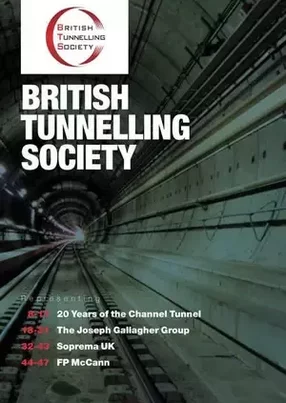For the majority of people in the UK, tunnels are a brief but essential part of daily travel avoiding the surface congestion in our cities. Very few are aware of the full extent of the engineering excellence that goes on beneath their feet as workers undertake the tasks associated with the creation of the underground spaces for road, rail, water, sewers, utilities and many more applications.
The recent TV coverage of Crossrail has given the public an insight of what ‘tunnelling’ is all about and the general feedback tends to be one of awe and amazement. We can easily become somewhat indifferent about the significance of our daily challenges and achievements and such coverage makes people realise what does go on beneath their feet and raises the profile of the industry.
We have a world-class heritage of tunnelling with the world’s first sub-aqueous tunnel built under the River Thames by Marc and Isambard Kingdom Brunel in 1843 and still operational today. Our extensive network of tunnels serving London Underground again bears testament to the ingenuity of tunnellers in the UK, as do the sewers built by Bazalgette and opened in 1865. More recently, we have had the Channel Tunnel, Heathrow Express, Jubilee Line, HS1 and the A3 Hindhead Tunnels.
It was my pleasure and an honour to take over from Damian McGirr as Chairman of the BTS in May this year. The BTS is an Associated Society of the ICE. With a current membership of over 700 individual members and in excess of 60 corporate members, it is one of the most vibrant gatherings of professional tunnellers in the world.
We are a forum to assist and encourage the dissemination of information relating to tunnelling and to act as a catalyst in the development of new technologies and standards that benefit the industry by improving knowledge, sustainability, efficiency, quality and safety in the construction and use of underground space. It is true to say that UK tunnelling is globally recognised and our standards and guidance are regularly adopted by projects around the world.
In recent years, the lack of Tunnel schemes in the UK has seen large numbers of skilled personnel leave for international projects. Now we have the prospect of increasing demands for tunnellers in the UK once again, there is a potential for a shortfall in capacity. One of the society’s aims is the attraction of ‘new blood’ into the industry. Through our Young Members, we regularly attend schools, universities and career fairs, giving prospective tunnellers a taste of what the industry offers. A strength of the BTS is that we welcome all tunnelling personnel within the industry, giving a greater depth to the ability and knowledge available.
The society has strong ties with both TunnelSkills and TUCA; these bodies are the industry’s response to the potential shortfall of skilled and competent personnel to ensure its future capability to deliver.
As an industry we have probably never had such a promising period ahead of us, with a range of projects currently underway or in the pipeline, and there has never been a better time to embark on a career in tunnelling.
With numerous LUL contracts and National Grid Power Tunnels well underway and Crossrail recently passing the halfway mark, we are looking to the next phase of works. Hinkley, Shieldhall, Bank Station and Northern Line Extension are all due to begin soon; Tideway, Silvertown and HS2 will become a reality in the near future. I cannot begin to mention numerous small schemes for utilities that tend to go unnoticed in the press.
In summary, the UK tunnelling industry is in an excellent position and I look forward to the coming years and the challenging work ahead for all of us.


